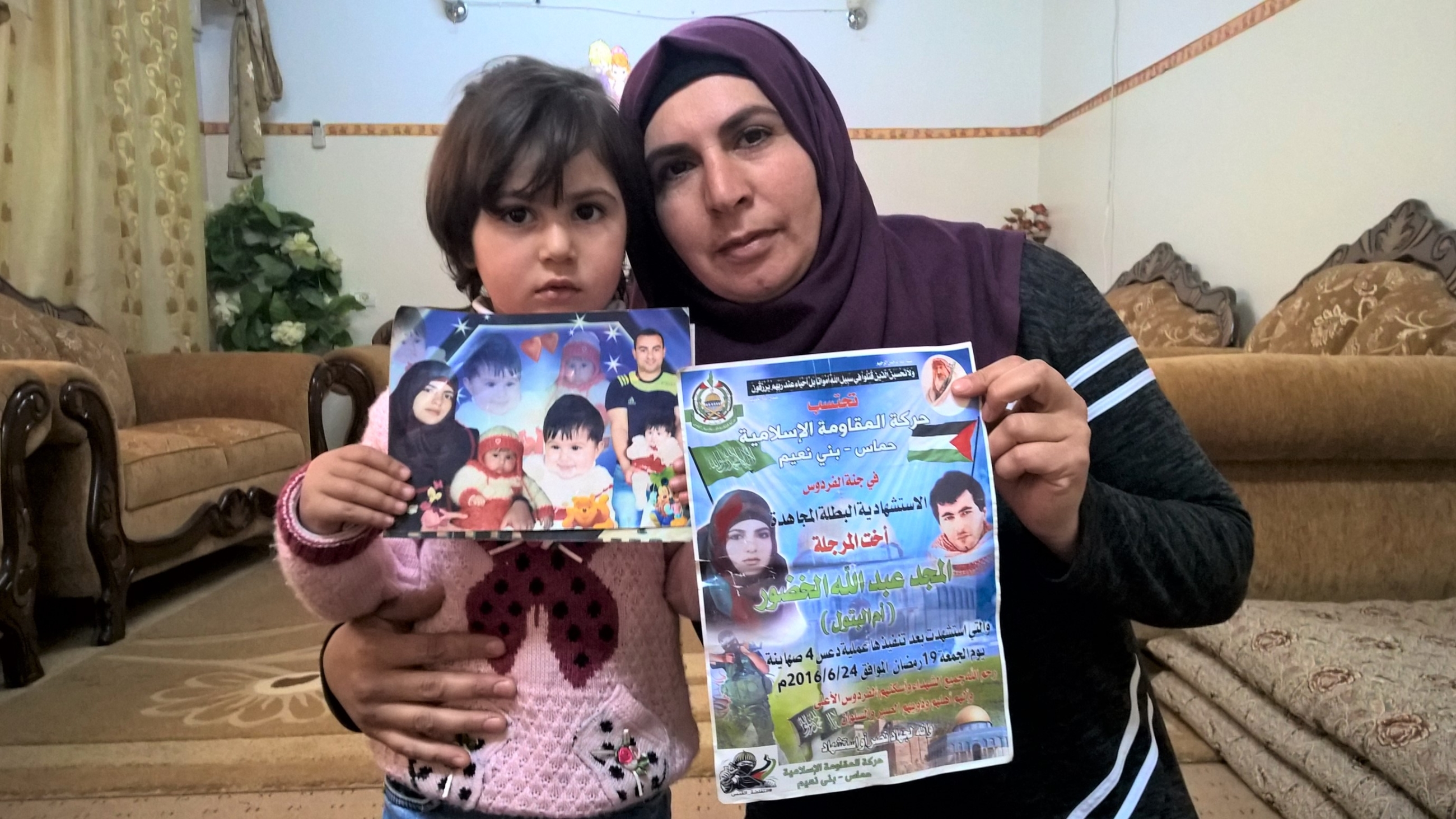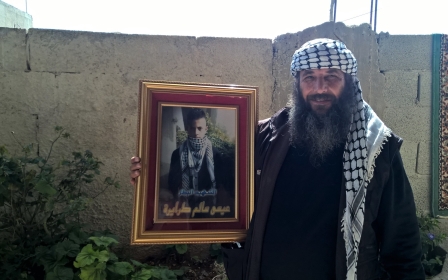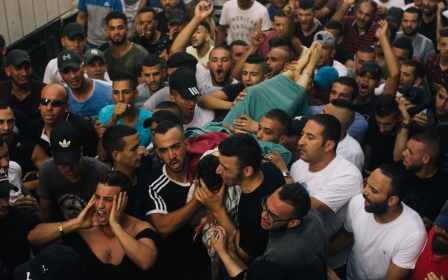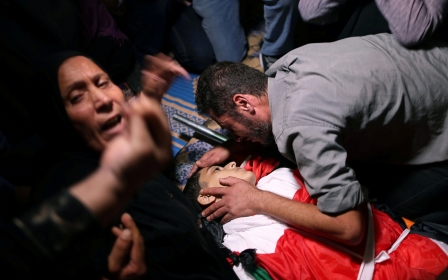Supreme Court allows Israel to continue holding bodies of killed Palestinians

The Israeli Supreme Court on Monday voted by a 4-3 majority that Israel has the right to withhold the bodies of 13 Palestinians killed by Israeli forces in its custody and be used as bargaining chips.
The ruling states that emergency regulations allow the Israeli military to order the temporary burial of the bodies of Palestinians classified as enemies “based on considerations that take into account state security, civil order, and the need to negotiate for the return of the bodies of Israeli soldiers”, the Legal Centre for Arab Minority Rights in Israel (Adalah) said in a statement Monday.
'This is one of the most extreme Supreme Court rulings since 1948, as it undermines the most basic principles of universal humanity'
- Adalah rights group
One of the lawyers on the case was told Monday morning that a verdict would be reached in the afternoon, without being given any more details.
“We understood that the political context and the timing, that it would be a negative decision and not in our favour as Palestinians,” said Salwa Hamad, the head of Jerusalem Legal Aid Center’s legal campaign, which is fighting for 116 bodies.
For decades, Israel has been following a policy of not releasing the bodies of Palestinians killed by its military to their families.
New MEE newsletter: Jerusalem Dispatch
Sign up to get the latest insights and analysis on Israel-Palestine, alongside Turkey Unpacked and other MEE newsletters
Adalah said the lawyers of families of the deceased Palestinians made the argument that holding the bodies violates both international law and Israeli law, which does not permit the military to keep bodies and use them as leverage.
“This is one of the most extreme Supreme Court rulings since 1948, as it undermines the most basic principles of universal humanity,” it said.
The verdict comes as a heated electoral campaign is underway a week ahead of Israeli legislative elections. Prime Minister Benjamin Netanyahu is hoping to secure a majority for his right-wing alliance.
Hamad said a full judicial panel of seven judges had been set up to decide on cases that Israel considers "unique" and undermine its security.
In December 2017, the Supreme Court ruled in a two-to-one vote that the army did not have authority to withhold bodies under the 1945 regulation, but gave the Israeli government a six-month deadline to enact a new law on the matter.
Israeli authorities instead requested another hearing in front of seven justices, which took place in July 2018.
'Occupation court'
Hamad said that the timing is not a coincidence, but it is an indication the Israeli court goes to great lengths to ensure Israel’s interests and to prove its loyalty to the state and its institutions.
"The timing of this decision raises many fundamental questions about the independence of the Israeli judiciary and its claim that it does not bow to the Israeli right," Hamad said.
“The Supreme Court is an occupation court, and we do not expect it to make decisions in our favour," Hamad said.
'The Supreme Court is an occupation court, and we do not expect it to make decisions in our favour,'
- Salwa Hamad, head of Jerusalem Legal Aid Center’s legal campaign
More than 250 bodies are currently being held at Israeli burial sites and morgues known by Palestinians as "cemeteries of numbers", named after the numbering system that replaces names on graves.
The ruling will be applied on all Palestinians buried in the “cemeteries of numbers” and the ones held in refrigerators since 2015, the last of whom is Bassam al-Sayeh who died Sunday in an Israeli prison.
In 2016, Israeli authorities started promoting the policy as a negotiation tool to return Israeli soldiers detained by Palestinians. At the time, the Israeli military asked for secret meetings with the courts and publicly stated that the detention of the bodies is a pressure card on Gaza.
Palestinian organisations and institutions in Jerusalem said in a statement issued on 20 August that Israel’s Public Security Minister Gilad Erdan has voiced his ministry’s intention to withhold the body of 14-year-old Nassim Abu Rumi in order to bargain for the return of the bodies of Israeli soldiers, especially that of Hadar Goldin.
'Immoral, inhuman'
On 15 August, Israeli border police officers shot and killed Abu Rumi after he and another youth, Hamouda al-Sheikh, lunged at them. A video of the incident shows the officers immediately opening fire on the boys.
“This extortionist logic is immoral, inhuman… it’s an added crime to the extrajudicial killing and field execution of Nassim Abu Rumi,” the statement said.
Nassim’s father, Mukafeh Abu Rumi, said the Israeli decision has weighed down on the entire family, which was hoping to receive the body of its son soon.
'The fate of my son’s body has become unknown. They probably won’t ever release him.. but we have faith his soul is in heaven now'
- Mukafe Abu Rumi
“The fate of my son’s body has become unknown. They probably won’t ever release him.. but we have faith his soul is in heaven now,” Mukafeh told MEE.
"This decision will not affect our determination to persevere in our resistance against the occupation," he said.
Mukafeh said the family is carrying out weekly peaceful activities as they march from their home in al-Eizariya, east of Jerusalem, every Friday, holding up photographs of Naseem and demanding the release of his body.
He said Israel is using its oppressive policies against Palestinians as a promotional tool during the electoral campaign.
According to court documents and lawyers, at least 45 Palestinians are missing from the "cemeteries of numbers" - many held since the aftermath of Israel's 1967 occupation of East Jerusalem, the West Bank and Gaza.
Palestinians say the practice deprives families the right to mourn their dead. Israel defends it as a deterrent to violence.
“This is collective punishment. The families will consider appealing to international courts in an effort to do everything possible to recover the bodies of their loved ones,” Muhammad Alyan, one of the petitioners, said in a statement issued on behalf of the Palestinian families.
Israel is the only country in the world currently implementing a policy of confiscation of remains, according to Jerusalem Legal Aid Center (JLAC) and Adalah. It relies on regulations dating back to 1945, during the British Mandate, to give grounds for its policy.
Middle East Eye delivers independent and unrivalled coverage and analysis of the Middle East, North Africa and beyond. To learn more about republishing this content and the associated fees, please fill out this form. More about MEE can be found here.




